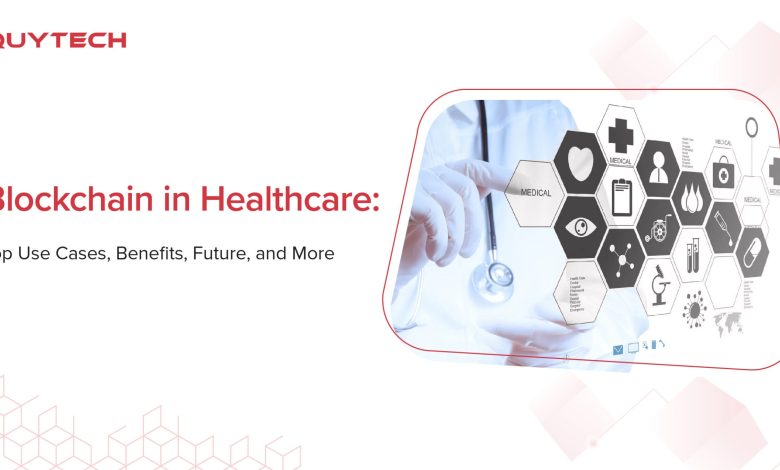Blockchain for Healthcare: Use Cases and Benefits

- Introduction to Blockchain Technology
- Benefits of Implementing Blockchain in Healthcare
- Use Cases of Blockchain in Healthcare
- Enhancing Data Security with Blockchain
- Improving Interoperability in Healthcare Systems
- Challenges and Future Outlook of Blockchain in Healthcare
Introduction to Blockchain Technology
Blockchain technology is a decentralized, distributed ledger system that securely records transactions across a network of computers. Each transaction is stored in a “block” that is linked to the previous block, forming a chain of blocks – hence the name “blockchain.” This technology ensures transparency, security, and immutability of data, making it an ideal solution for industries like healthcare that require secure and efficient data management.
In the healthcare sector, blockchain technology has the potential to revolutionize the way patient data is stored and shared. By utilizing blockchain, healthcare providers can securely store patient records, ensuring that sensitive information is protected from unauthorized access. Additionally, blockchain can streamline processes such as insurance claims processing, drug traceability, and clinical trials management, leading to improved efficiency and reduced costs for healthcare organizations.
One of the key benefits of blockchain technology in healthcare is its ability to provide a single source of truth for patient data. This means that all relevant parties, including patients, doctors, and insurers, can access and update the same information in real-time, reducing the risk of errors and discrepancies. Furthermore, blockchain can enhance data security by encrypting information and providing a tamper-proof audit trail of all transactions, ensuring the integrity of the data.
Overall, blockchain technology holds great promise for transforming the healthcare industry by improving data management, enhancing security, and increasing efficiency. As more healthcare organizations adopt blockchain solutions, patients can expect to see better outcomes, reduced costs, and increased trust in the healthcare system.
Benefits of Implementing Blockchain in Healthcare
Implementing blockchain technology in healthcare offers a wide range of benefits that can revolutionize the industry. Some of the key advantages include:
- Enhanced security: Blockchain provides a secure and tamper-proof way of storing and sharing patient data, reducing the risk of data breaches and unauthorized access.
- Improved interoperability: By using a decentralized system, blockchain enables different healthcare providers to access and share patient information seamlessly, leading to better coordination of care.
- Increased transparency: The transparent nature of blockchain allows patients to have more control over their own health data and understand how it is being used.
- Streamlined processes: Blockchain can automate and streamline administrative tasks such as billing and claims processing, reducing costs and improving efficiency.
- Enhanced data integrity: With blockchain, data is stored in a way that ensures its accuracy and consistency, reducing errors and improving the quality of care.
Overall, implementing blockchain in healthcare can lead to a more secure, efficient, and patient-centered system that benefits both providers and patients alike.
Use Cases of Blockchain in Healthcare
Blockchain technology has numerous use cases in the healthcare industry, offering innovative solutions to long-standing challenges. Some of the key applications of blockchain in healthcare include:
- **Secure** sharing of medical records: Blockchain allows for the secure and **immutable** storage of patient data, enabling healthcare providers to access **encrypted** medical records in real-time. This ensures that patient information is **protected** from unauthorized access and tampering.
- Streamlining **clinical** trials: Blockchain can facilitate the **transparent** and efficient management of **clinical** trial data, ensuring **integrity** and **traceability** throughout the process. This can help **accelerate** the development of new **treatments** and **therapies**.
- Supply chain **management**: Blockchain technology can be used to track the **movement** of pharmaceuticals and medical devices throughout the supply chain, reducing the risk of **counterfeiting** and ensuring **compliance** with **regulatory** requirements.
- **Identity** management: Blockchain offers a **secure** and **decentralized** solution for **identity** management, allowing patients to **control** access to their **personal** health information and **authenticate** their **identity** when interacting with healthcare providers.
- **Billing** and **claims** processing: By **automating** and **verifying** **billing** and **claims** processing through smart contracts, blockchain can help reduce **fraud** and **errors** in the **reimbursement** process, leading to **cost** savings for healthcare organizations.
Enhancing Data Security with Blockchain
Enhancing data security with blockchain technology is a crucial aspect of its application in the healthcare industry. By utilizing blockchain, healthcare organizations can ensure that patient data is securely stored and shared, reducing the risk of data breaches and unauthorized access.
One of the key benefits of using blockchain for data security is its decentralized nature. This means that patient data is not stored in a central location, making it less vulnerable to cyber attacks. Additionally, blockchain uses encryption techniques to secure data, making it virtually impossible for hackers to access or tamper with sensitive information.
Another advantage of blockchain technology is its transparency and immutability. Each transaction or data entry is recorded on a distributed ledger, which is visible to all parties involved. This transparency helps to build trust among stakeholders and ensures the integrity of the data.
Furthermore, blockchain technology allows for granular access control, meaning that healthcare providers can specify who has permission to view or modify certain data. This helps to protect patient privacy and ensures that sensitive information is only accessible to authorized personnel.
In conclusion, leveraging blockchain for data security in healthcare can significantly enhance the protection of patient information, reduce the risk of data breaches, and improve overall trust in the healthcare system. By implementing blockchain technology, healthcare organizations can ensure that patient data remains secure, private, and tamper-proof.
Improving Interoperability in Healthcare Systems
Improving interoperability in healthcare systems is a crucial aspect of enhancing patient care and streamlining operations. By utilizing blockchain technology, healthcare organizations can overcome the challenges associated with siloed data and incompatible systems. Blockchain allows for secure and transparent sharing of data across different platforms, ensuring that patient information is accurate and up-to-date.
One of the key benefits of blockchain in healthcare is its ability to create a single source of truth for patient data. This eliminates the need for manual reconciliation of records and reduces the risk of errors. Additionally, blockchain can help improve data security by encrypting information and providing a tamper-proof audit trail.
With blockchain, healthcare providers can access real-time information about a patient’s medical history, medications, and treatments. This can lead to more informed decision-making and better coordination of care. By standardizing data formats and protocols, blockchain promotes seamless communication between different systems and stakeholders.
Overall, blockchain technology has the potential to revolutionize the healthcare industry by improving interoperability, enhancing data security, and enabling more efficient and effective patient care. As more organizations adopt blockchain solutions, the future of healthcare looks brighter and more interconnected than ever before.
Challenges and Future Outlook of Blockchain in Healthcare
One of the main challenges facing the implementation of blockchain in healthcare is the issue of data privacy and security. As patient information is highly sensitive, ensuring that it is protected from unauthorized access is crucial. Blockchain technology can help address this challenge by providing a secure and immutable way to store and share data.
Another challenge is the interoperability of different systems within the healthcare industry. With numerous stakeholders involved in patient care, ensuring that data can be seamlessly exchanged between different platforms is essential. Blockchain has the potential to streamline this process by creating a unified system that all parties can access and update in real-time.
Looking towards the future, blockchain technology holds great promise for revolutionizing the healthcare industry. By enabling secure and transparent transactions, reducing administrative costs, and improving data accuracy, blockchain has the potential to transform the way healthcare is delivered and managed.
